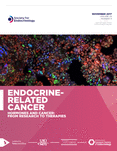IGF2 and cancer
- 1Peptide Hormones Supraregional Assay Service (SAS), Clinical Biochemistry Department, Royal Surrey County Hospital NHS Trust, Guildford, Surrey GU2 7XX, UK
2Faculty of Health and Medical Sciences, University of Surrey, Guildford, Surrey GU2 5XH, UK
- Correspondence should be addressed to C Livingstone; Email: callum.livingstone{at}nhs.net
Abstract
Insulin-like growth factor 2 (IGF2) is a 7.5 kDa mitogenic peptide hormone expressed by liver and many other tissues. It is three times more abundant in serum than IGF1, but our understanding of its physiological and pathological roles has lagged behind that of IGF1. Expression of the IGF2 gene is strictly regulated. Over-expression occurs in many cancers and is associated with a poor prognosis. Elevated serum IGF2 is also associated with increased risk of developing various cancers including colorectal, breast, prostate and lung. There is established clinical utility for IGF2 measurement in the diagnosis of non-islet cell tumour hypoglycaemia, a condition characterised by a molar IGF2:IGF1 ratio >10. Recent advances in understanding of the pathophysiology of IGF2 in cancer have suggested much novel clinical utility for its measurement. Measurement of IGF2 in blood and genetic and epigenetic tests of the IGF2 gene may help assess cancer risk and prognosis. Further studies will determine whether these tests enter clinical practice. New therapeutic approaches are being developed to target IGF2 action. This review provides a clinical perspective on IGF2 and an update on recent research findings.
- Revision received 29 August 2013
- Accepted 26 September 2013
- Made available online as an Accepted Preprint 30 September 2013
- © 2013 Society for Endocrinology












